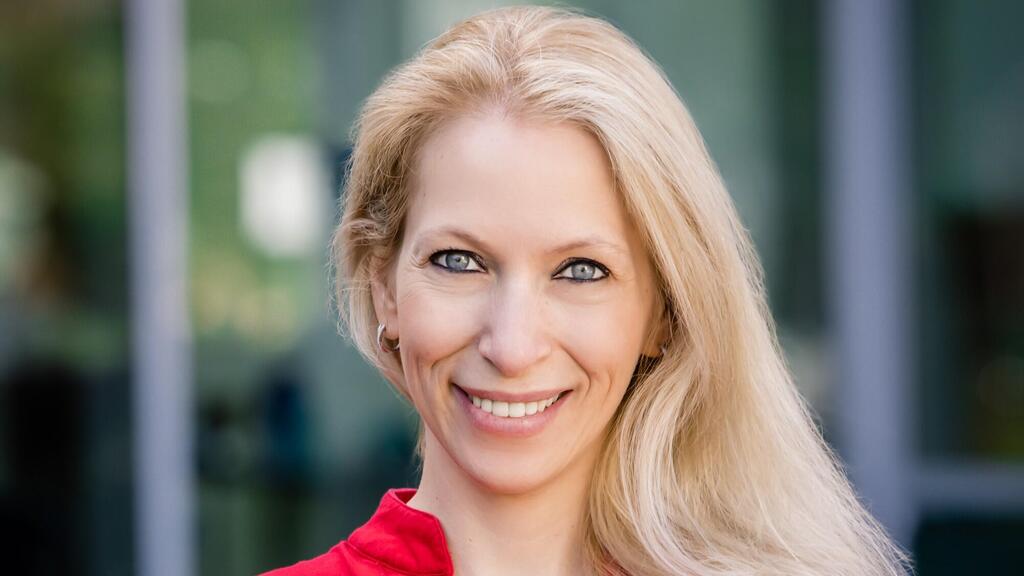
HR in the AI Era
Here’s how Next Insurance is using AI to amplify what great HR can be
AI is transforming how Next Insurance works at a fundamental level, both across the company and within HR.
“This level of disruption is a good thing,” said Sivan Avihud, Global VP of People at Next Insurance. “It’s pushing us to evolve faster, think more strategically, and make a bigger impact with fewer resources. We see AI not as a threat, but as an amplifier of what great HR can be.”
CTech’s "HR in the AI Era" series explores how the AI revolution is impacting the workforce across Israeli high-tech companies. In this series, we uncover the effects (both personal and professional) that this technology shift has had on Startup Nation.
“We don’t see AI as a tool. We see it as an accelerator for better decisions, deeper insights, and a more empowered workforce,” she added. “The future of HR isn’t just more digital – it’s more intelligent.”
You can read the entire interview below.
Company name: Next Insurance
Your name and title: Sivan Avihud, Global VP of People
Names of founders and upper management: Nissim Tapiro (CTO) and Guy Goldstein (CEO)
Year of founding: 2016
Investment stage: Late-stage investment
Total investment to date: $1.1 Billion
Field of activity: FinTech
Number of employees: 750
Office location: Kfar Saba (Israel), Palo Alto (California), Waltham (Boston), Rochester (New York )
Number of open positions: 20 globally throughout the year
On a scale of 1-10, how much does the AI revolution disrupt your company operation in general, and the HR department specifically?
10
How so?
I rated the impact of AI as a 10 because it’s not just a tool we’ve added, it’s transforming how we work at a fundamental level, both across the company and within HR.
At the company level, AI is accelerating how we analyze data, make decisions, and deliver services. From modeling commission spend with Monte Carlo simulations to integrating AI in customer service workflows, we’re seeing tangible gains in speed, efficiency, and insight.
Within HR, the disruption is even more pronounced because of the scope and variety of our responsibilities. AI is helping us:
- Recruit smarter and faster, using AI tools for candidate sourcing, outreach, and interview support.
- Deliver more personalized, scalable learning experiences, and enable teams to adopt tools like Gemini and ChatGPT in their daily work.
- Draft policies and communications with greater clarity and speed while maintaining consistency and compliance.
- Improve employee experience through real-time knowledge support, faster response times, and insights from feedback and engagement data.
- Stay ahead of compliance in areas like benefits, leave, and immigration through AI-driven scenario modeling and benchmarking.
That said, we’re not adopting AI blindly. We're actively working to:
- Build AI literacy across the org so teams use it with confidence and judgment.
- Stay vigilant about bias, ethics, and data privacy.
- Preserve the human side of HR, empathy, strategic advising, and culture-building - which AI cannot replace.
This level of disruption is a good thing. It’s pushing us to evolve faster, think more strategically, and make a bigger impact with fewer resources. We see AI not as a threat, but as an amplifier of what great HR can be.
What interesting AI tools do you and your staff use in employee management/recruitment?
We’re leaning into AI not just to make HR faster – but smarter, more personalized, and more human at scale. Here are some of the most exciting tools we’re using in employee management and recruitment:
In Talent Acquisition
- AI-Sourced Candidate Pools: We use AI to auto-generate dynamic pools of passive candidates that evolve in real time. It’s like having a 24/7 sourcer constantly updating the pipeline.
- Smart Outreach and Messaging (LinkedIn, Greenhouse): AI drafts high-converting, role-specific outreach messages with the right tone and personalization, freeing our recruiters to focus on the human side of hiring.
- AI-Enhanced Interviewing: From generating laser-targeted interview questions to refining scorecards for clarity and bias reduction, we’re using AI to make interviews more structured and equitable.
In Employee Management
- ChatGPT as a Strategic Co-Pilot: We use it to draft clear, empathetic communications, model complex policy scenarios, and even storyboard new benefit launches - at the speed of thought.
- AI-Powered Knowledge Assistants (e.g. Unleashed): Think of an always-on internal AI concierge that helps our service teams answer complex employee questions faster, smarter, and without switching systems.
- Hyper-Personalized L&D (Gemini + Adaptive Learning): We’re building toward learning that adapts to you: content, pace, and feedback - all AI-curated to match how each person learns best. It’s coaching, on demand.
- People Analytics on Steroids: We use AI to surface hidden patterns in engagement, attrition, pay equity, and more - turning gut-checks into data-backed strategy moves.
We don’t see AI as a tool. We see it as an accelerator for better decisions, deeper insights, and a more empowered workforce. The future of HR isn’t just more digital – it’s more intelligent.
In which roles or tasks within your company has AI already begun to replace human labor (if at all)?
Not at all – AI hasn’t replaced human labor in our company. Instead, it’s helping us get better: faster decisions, sharper insights, and higher-quality output. We're using AI as an amplifier, not a substitute.
Across HR and the broader business, AI is helping us:
- Automate repetitive, low-value tasks (like scheduling, template creation, and policy formatting)
- Generate first drafts so we can focus on refining and strategic thinking
- Analyze data faster so we can spend more time acting on insights
But the judgment, empathy, creativity, and leadership that drive our work remain fully human. AI is a partner in performance – not a replacement.
What are the two major challenges you are coping with these days?
We're currently navigating two major challenges – both full of opportunity:
Post-Acquisition Integration: We’re in the midst of an exciting acquisition, and our focus is on designing “the day after”. We're working hard to protect what makes our culture special while aligning with new structures, systems, and leadership. At the same time, we’re actively leveraging the new opportunities this change brings, whether it’s expanding our reach, accessing new markets, or accelerating innovation. It’s a moment of transition, but also tremendous potential.
Scaling in a Changing Market: In parallel, we’re focused on scaling and delivering exceptional results. That means meeting our numbers, supporting more customers, and developing more products – while staying true to our values and keeping our people engaged and energized.
Have you experienced workforce-related challenges due to the war, and are you still feeling the impact of the security situation on your human resources?
No, we haven’t experienced workforce-related challenges due to the war. Our people are incredibly engaged – they love what they do, and for many, work has been a source of stability and sanity during uncertain times. We’ve seen extraordinary resilience, focus, and strength across the organization.
That said, we do have team members who are serving in the reserves, or have close family members who are. We actively support them, through flexibility, empathy, and whatever resources they need. Their commitment, both personally and professionally, is a constant source of inspiration.
I feel genuinely lucky to work alongside such committed, mission-driven individuals. Their dedication and spirit continue to inspire me every day.
Have you made changes to your workforce following the increased use of AI tools, both in terms of headcount and internal shifts between departments?
No, we haven’t made workforce changes in terms of headcount or internal shifts as a result of adopting AI tools. But AI has absolutely transformed how we scale. We’re able to grow the business, serve more clients, support more operations, and develop more products – all with nearly the same team size.
What’s important to note is that AI has been part of our DNA from day one. We embraced it early, and our products are built with AI at the core. Our Machine Learning and AI teams continue to grow, but that growth was always part of the plan, not a recent shift.
AI isn’t replacing people here, it’s enabling us to do more, faster, and better. It’s helping us unlock the next level of our business without compromising quality, culture, or clarity of focus.
How does the global market uncertainty affect your workforce, in terms of employee numbers or departmental reallocations? Are you scaling your workforce up or down in different regions around the world?
The global market uncertainty hasn’t negatively impacted our workforce, in fact, we’re in a position of strength. We’re not scaling down; we’re scaling smarter.
Because we embraced AI early and built our products with AI at the core, we’re able to grow the business, expand our reach, and support more customers without needing to dramatically increase headcount. That means we can stay focused, agile, and high-performing – regardless of external conditions.
Our teams are deeply engaged, resilient, and energized by the opportunity to do meaningful work. We’re continuing to invest in key areas like AI and Machine Learning, and any changes we make are driven by strategy, not uncertainty. We’re excited about where we’re headed, and we have the people and tools to get there.
Do you estimate that in 2025–2026 you will increase or decrease the number of personnel? Explain why.
We anticipate some increase in headcount in 2025–2026, aligned with our business growth and strategic priorities.
Thanks to our early investment in AI and a strong, resilient team, we’re able to do more with greater efficiency. That said, as we continue to expand our product offerings, serve more customers, and invest in innovation, especially in AI and Machine Learning – we expect to grow our team selectively to support those goals.
Our approach is intentional: we’re scaling thoughtfully, focusing on high-impact roles that help us maintain momentum, quality, and agility as we grow.
What is your bottom line on this topic?
We view AI not as a disruption, but as a catalyst for smarter growth, stronger teams, and better business outcomes. What makes our organization stand out is the way our people have embraced AI with curiosity, adaptability, and purpose. We're not just keeping up - we’re building a future-ready culture where innovation and resilience go hand in hand. I’m proud of what we’ve accomplished and excited for what’s ahead.
First published: 09:32, 18.05.25













